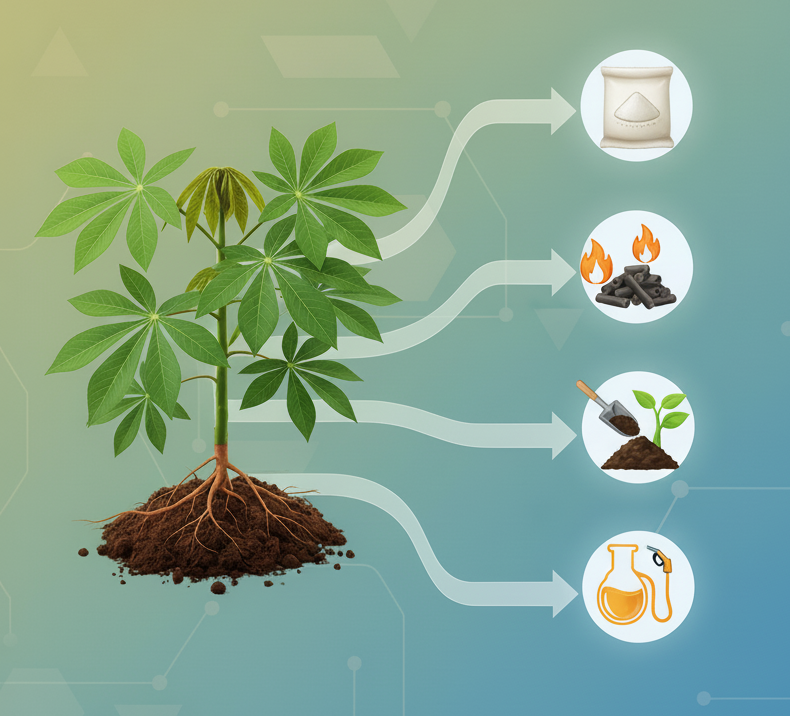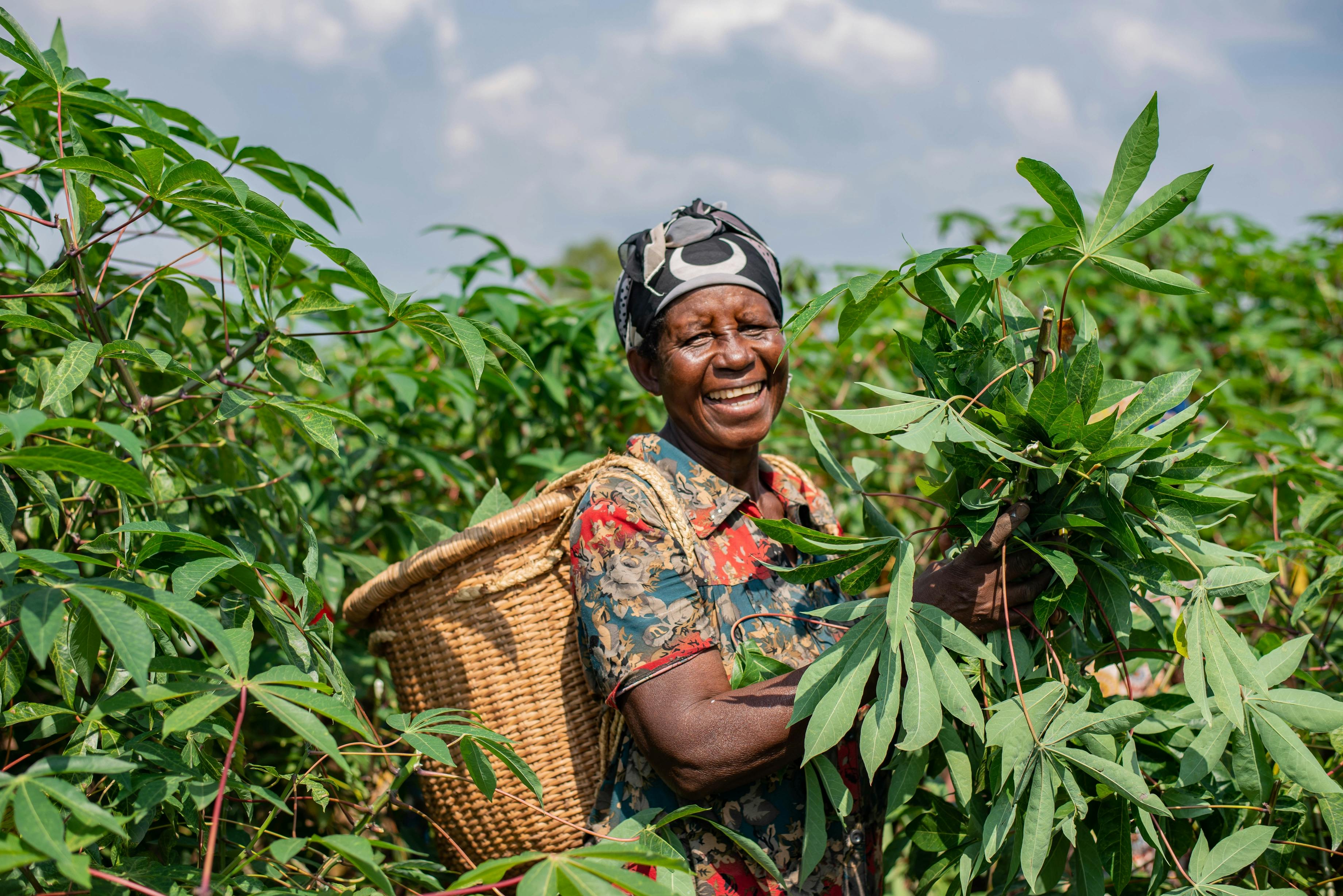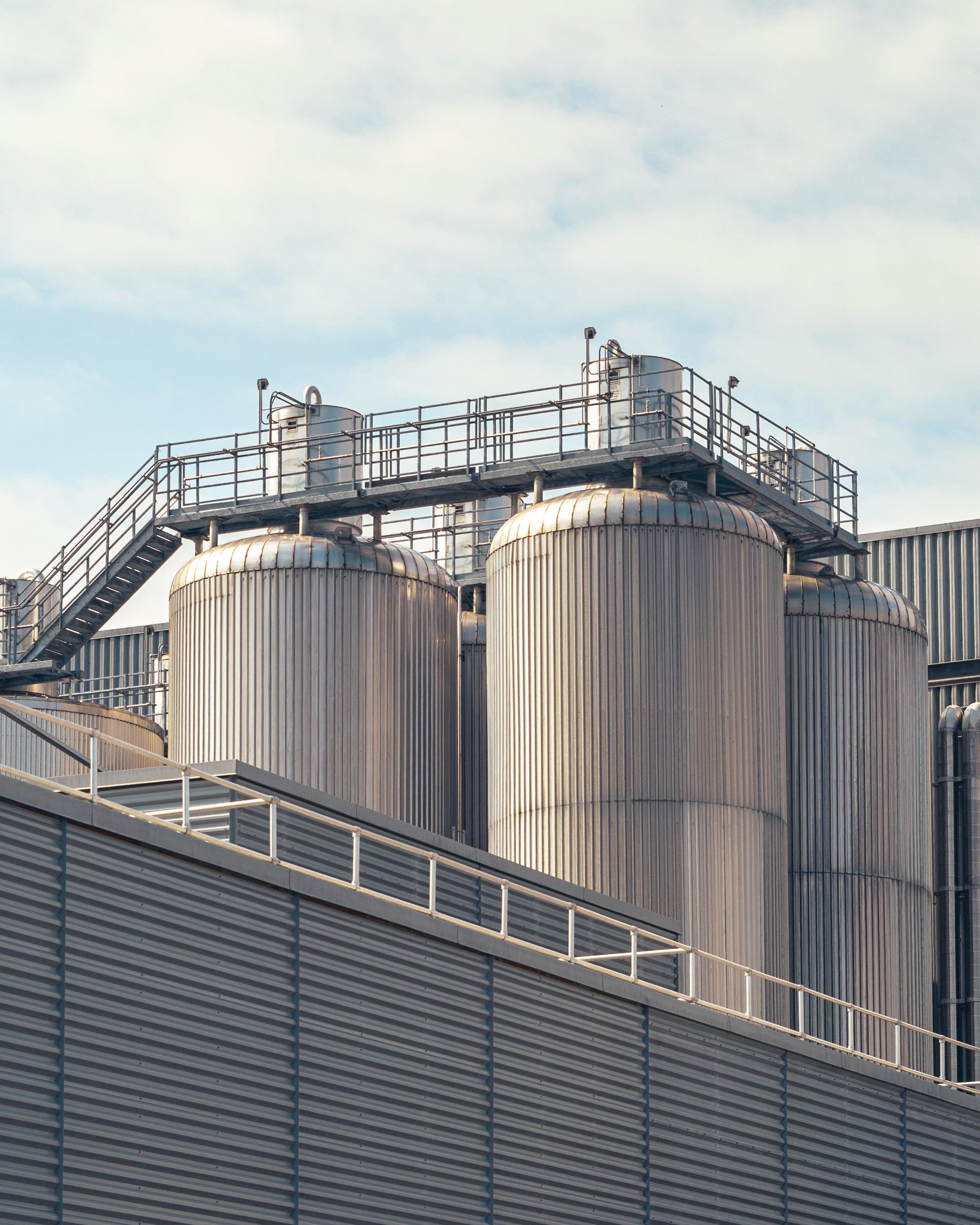
Cassava: Sustainable Agriculture Meets Innovation
Sourced from our state-of-the-art cultivation operations in Cambodia, our cassava represents the future of sustainable agriculture. Grown on over 21,000 hectares of carefully managed land, our cassava production combines traditional agricultural wisdom with modern farming techniques.
Why Our Cassava Stands Apart
Our cassava is cultivated as part of an integrated, circular agricultural system that maximizes resource efficiency while minimizing environmental impact. Every part of the cassava plant serves a purpose - from root to stalk - creating zero waste and maximum value. We produce 900,000 tons annually through a modular, standardized approach that ensures consistent quality.
Sustainably Grown, Globally Certified
Cultivated in Cambodia's ideal tropical climate with abundant rainfall and optimal temperatures, our cassava thrives naturally with minimal intervention. Our operations maintain low production costs while adhering to international environmental standards, making sustainable agriculture economically viable.

Four Integrated Products from Every Cassava Plant
Our innovative processing system transforms cassava into four distinct, high-value products, demonstrating the remarkable versatility of this resilient crop:
1. Cassava Starch (Tapioca Flour) - 230,000 tons/year
Premium food-grade and industrial starch for global markets
2. Biomass Pellet - 350,000 tons/year
Clean, renewable energy fuel produced from cassava stalks
3. Organic Fertilizer - 57,500 tons/year
Nutrient-rich soil amendment from processing by-products
4. Bioethanol - 100,000 tons/year
Advanced biofuel for transportation and industrial applications

Strategic Location
Our primary cassava production is located in Cambodia, with Vietnam serving as our secondary production site. Located between Cambodia and Vietnam - the world's largest cassava production and consumption markets - our operations benefit from established supply chains and stable sales partnerships. Our major export markets include the USA, Europe, Australia, and China, giving us direct access to key global markets.

Tapioca Flour: Pure, Versatile, and Naturally Gluten-Free
Our premium tapioca flour (cassava starch) is processed from carefully selected cassava roots using advanced extraction technology that preserves the natural properties of this remarkable ingredient. With an annual production capacity of 230,000 tons, we supply food manufacturers, industrial clients, and health-conscious consumers across the USA, Europe, Australia, and China.
Product Excellence
Extracted from fresh cassava using cutting-edge processing facilities with two 100,000-ton production lines designed by industry leaders, our tapioca flour meets the highest international quality standards. The result is a fine, white powder with exceptional functional properties and absolute purity.
Diverse Applications
Food Industry:
- Gluten-free baking and cooking
- Beverage production and clarification
- Candy and confectionery manufacturing
- Natural thickening agent for sauces and soups
Industrial Uses:
- High-performance adhesives and glue
- Paper and textile manufacturing
- Biodegradable product development
- Specialty industrial applications
Pharmaceutical & Cosmetic:
- Pharmaceutical tablet binding and coating
- Cosmetic formulations and powders
- Personal care product ingredients
The Sustainable Choice
Our tapioca flour is produced as part of a comprehensive recycling production chain. By-products from starch extraction are converted into organic fertilizers and renewable energy, creating a truly circular production system that benefits both our clients and the environment.
Quality Assurance
Every batch undergoes rigorous testing to ensure consistency in viscosity, purity, and performance characteristics, giving you complete confidence in your supply chain.
Biomass Pellet: Clean Energy from Agricultural Waste
Our self-innovated biomass pellet technology transforms cassava stalks - traditionally considered waste - into premium renewable fuel with an annual production capacity of 350,000 tons. Cassava is not only a food source but can also be refined into clean energy products like ethanol and biomass pellets, demonstrating the plant's remarkable versatility as a renewable resource.
Key Advantages
High Energy Performance:
- High energy output with clean combustion
- Consistent heat generation
- Easy to burn with high combustion efficiency
- Minimal residual carbon and ash
Environmental Benefits:
- Made from sustainably harvested cassava stalks
- Sulfur-free composition prevents equipment corrosion
- Zero sulfur dioxide or phosphorus pentoxide emissions
- Does not contribute to acid rain
- Significantly reduced carbon footprint
Economic Value:
- Lower cost than fossil fuels
- Attractive calorific value
- Stable, renewable energy source
- Reduces industrial energy costs
Applications
Ideal for industrial heating, power generation, biomass boilers and furnaces, and as a coal replacement in manufacturing processes.

Organic Fertilizer: Completing the Natural Cycle
Our organic fertilizer (57,500 tons/year) represents circular economy principles in action, returning valuable nutrients to the soil from cassava processing by-products.
Benefits
Nutrient-Rich:
- High organic matter content
- Natural soil conditioning properties
- Slow-release nutrient profile
- Improves soil structure and water retention
Environmentally Sound:
- Reduces chemical fertilizer dependence
- Zero synthetic additives
- Supports sustainable agriculture
- Enhances long-term soil productivity
Cost-Effective:
- Alternative to expensive chemical fertilizers
- Supports organic certification programs
- Reduces overall farm input costs
Applications
Perfect for large-scale agricultural operations, organic farming, cassava cultivation, and sustainable plantation management.

Bioethanol: The Future of Clean Transportation
Our bioethanol production (100,000 tons/year) represents cutting-edge clean fuel technology, offering an environmentally friendly alternative to petroleum-based fuels. Through advanced refining processes, cassava is transformed into this clean energy source, showcasing the crop's potential beyond traditional food applications.
Proven Environmental Benefits
Emissions Reduction:
- 10% ethanol blend reduces NMHC by 20% and carbon by 14% (Oak Ridge National Laboratory)
- 10% ethanol blend reduces PM 2.5 emissions by 50% (USA, Australia, England, Canada environmental agencies)
- Significantly cleaner combustion than pure gasoline
Renewable Resource:
- Derived from abundant cassava feedstock
- Reduces dependence on fossil fuels
- Can be processed into biogas, fertilizer, and CO₂
- Truly sustainable fuel source
Global Adoption:
- Currently used by USA, EU, and Australia as oil additive and substitute
- Growing market demand worldwide
- Compatible with existing vehicle engines
- Industry-standard production methods
Applications
Current Use:
- Gasoline additive (E10, E15, E20 blends)
- Direct petroleum substitute
- Transportation biofuel
Future Applications:
- Bio-polyethylene production
- Fuel cell vehicle power source
- Advanced green technology integration
Competitive Advantages
- Cost-Effective: Operations in Cambodia offer land use costs at only 10% of comparable Chinese facilities
- Zero-Waste Production: Integrated recycling chain reduces transportation fees by up to 80%
- Reliable Supply: Modular, standardized management ensures consistent output and quality
- Strategic Partnerships:
- COFCO (China's largest cassava importing enterprise) for starch products
- Sumitomo Corporation (major Japanese importer) for biomass pellets
- Tian Guan Group (China's largest ethanol producer) for technology and operations
The Integrated System
What sets our operation apart is the seamless integration of all four products within a single, zero-waste system where cassava roots become starch, processing residues become fertilizer, stalks become biomass pellets, and fermentation produces bioethanol - maximizing value while minimizing environmental impact.
